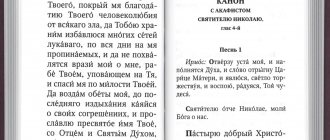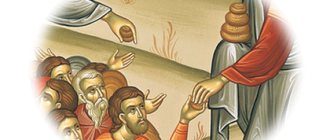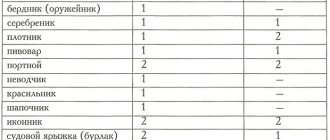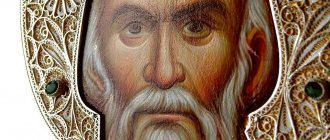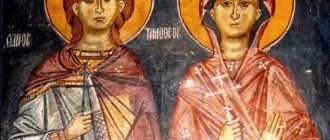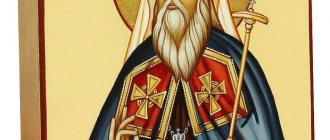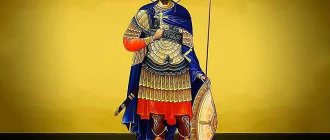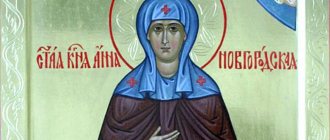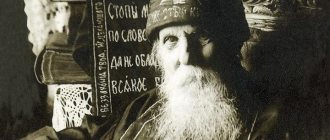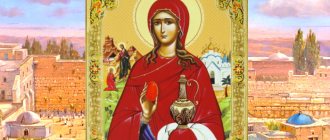Life of the first Metropolitan of Kyiv Michael
The first Metropolitan of Kiev, who served immediately after the baptism of Rus', Michael, is mentioned in some chronicles as a Bulgarian, and in others as a Syrian. After Equal-to-the-Apostles Prince Vladimir conquered the Greek city of Korsun, he received holy water Baptism there and proclaimed the adoption of the new faith by Russia. To gain the support of the Byzantine emperors, he married Princess Anna.
After accepting Christ, Prince Vladimir was inflamed with the desire to enlighten all his people with the light of the new faith, and therefore sent an embassy from Korsun to Constantinople (the capital of the Byzantine state) with a request to the emperor and patriarch to send shepherds to Kyiv to explain the foundations of Christianity to their subjects, who worshiped pagan gods.
The Patriarch of Byzantium and Constantinople, Saint Nicholas Chrysoverg, convened a council of bishops, and at it it was decided to send Saint Michael to preach the Gospel to the Russian people. Among the clergy, he was famous as a prudent, flexible person with the gift of teaching.
No information about the early years of the first metropolitan has survived to this day, so it is impossible to say with certainty which people he belonged to and what his path to the priesthood was. After Michael received parting instructions and blessings from the Byzantine patriarch, he went to Prince Vladimir to help the Equal-to-the-Apostles organize the first Christian church in Rus'.
However, the first metropolitan did not go to the prince alone; he took with him many elders and clergy, as well as 6 bishops, so that they would lead new churches in large cities. The Equal-to-the-Apostles Prince of Kiev Vladimir solemnly met the clergy from Byzantium, and together with the priests and Princess Anna went back to Kyiv. This procession was leisurely and symbolized the rejection of the worship of pagan idols, the eradication of ignorance and the adoption of the new Christian faith.
The short time that Michael held the position of Metropolitan of Kyiv, he devoted to preaching the Holy Scriptures, apostolic work, baptism and confirmation of converts in the faith. First of all, the saint baptized the entire princely family, and then the squad and boyars; this became an example for the common people and made it possible to avoid unrest in connection with the advent of a new faith.
Vladimir promoted the spread of Christianity and crushed all the stone idols that the inhabitants of the country worshiped. After this, the ruler ordered all the people, young and old, to gather on the banks of the Dnieper River, where the Metropolitan and the priests performed the first water baptism.
In addition to the capital of the principality, Kyiv, Saint Michael traveled to Rostov the Great and Novgorod, where he also preached the Word of God and baptized people. Christian churches were built, where the Metropolitan appointed priests to perform divine services and teach the flock.
Saint Michael passed away to the Lord in 992, Prince Vladimir lost not only a pious priest, but also a wise state adviser. The first Metropolitan of Kiev was buried in the Church of the Tithes, which was erected in honor of the Most Holy Theotokos during the life of the saint.
In the 12th century, the found relics of the saint, which were not touched by decay, were transferred to the Kiev Pechersk Lavra, and at the beginning of the 18th century - to the Great Assumption Church, where they remain to this day.
Texts of prayers
There are several prayers that are usually read at home before the image of the saint, and an akathist used at church services.
Troparion
Today the prophecy of the First-Called Apostles has been fulfilled: behold, grace has risen on these mountains and faith has increased. And who, through unbelief, became dilapidated by the Divine font, was born and was born into people's renewal, the royal priesthood, the holy tongue, the flock of Christ, to whom you were the first shepherd, as you first served with Baptism. And now, standing before the Master Christ God, pray to all Russian sons to be saved: for you have boldness as a hierarch of God and a clergyman.
Kontakion
The second Moses appeared to Russia, Father, bringing mental grapes from Egyptian idolatry to the land foreseen by prophecy. There will be, he said, the establishment of faith on earth, and on the tops of the Kyiv mountains the fruit will be exalted more than Lebanon, nourishing the whole world, having tasted from the worthless, we please you, Michael, God's hierarch.
Prayer
Great and glorious holy archpastor and our father Michael, the first throne of the Russian country and enlightener, trustworthy intercessor of all Christian tribes before God, we pray to you: help us to be an imitator of your love for God, with which you were filled in your earthly belly. Enlighten our minds and hearts with the light of Divine teaching. Teach us to follow you faithfully and to diligently do the commandments of the Lord, so that we may be known as your children not only by name, but also by all our lives. Pray, Equal to the Apostles, hierarch, for the Russian Church, for your city and monastery, in which your saints rest incorruptibly, and for our entire Fatherland, look mercifully on all your faithful admirers who seek your help: be a healer to everyone in sickness, in sorrow and a comforter to the sorrowful, a helper in troubles and needs, and in the hour of death an intercessor and patron, so that with your help we, too, sinners, may be worthy to receive salvation and inherit the Kingdom of Christ. To her, the saint of Christ, if you are willing to help us, and trust in your help, let us glorify the wondrous God in His saints, the Father and the Son and the Holy Spirit, now and ever and unto ages of ages. Amen.
Akathist
Kontakion 1
The vessel chosen from Christ God was sent to the land of Russia and our tongue was enlightened by holy baptism to the Holy Hierarch Father Michael, who is also now facing His Master in heaven , therefore pray diligently, that your flock may be delivered from all troubles and misfortunes, and we call to you:
Rejoice, Michael, great hierarch, most glorious primate of the Russian Church.
Ikos 1
Archangels and angels, King, and all creatures, Creator and Provider, show His mercy to the people of our country, who walked in the darkness of idolatry, and to you, Saint Michael, as an apostle ambassador May this enlighten you with the light of true knowledge of God. And with these teachings of yours, even before the sacrifice of the demon, you now donate your souls to Christ. To you they offer hymns of thanksgiving:
Rejoice, diligent planter of the faith of Christ; Rejoice, you who have eradicated idolatry.
Rejoice, you who have abolished the demonic sacrifices; Rejoice, light, who shone forth from the east.
Rejoice, thou who hast dispersed the darkness of idolatry; Rejoice, you who enlightened people with the teachings of Christ.
Rejoice, thou who destroyed the idolatrous demands with the cross; Rejoice, thou who tilled Christ's field well.
Rejoice, fruitful seed on her, all appearing; Rejoice, honey-flowing mouth of Christ;
Rejoice, harmonious flute of the Holy Spirit.
Rejoice, Michael, great hierarch, most glorious primate of the Russian Church.
Kontakion 2
You have seen, O Saint Michael, the fruits of your labors in preaching to the citizens of the glorious city of Kiev, listening to the truth of your teaching with all your soul and heart, having believed in Christ the true God, I turned away from the idols of the earth and crushed them, and swept some of them into the river with desecration, in the lower Besi: “O cruelty to us,” crying out. In vain is this, blessed father, you rejoiced in your spirit, singing gratefully to God: Alleluia.
Ikos 2
I have a divinely inspired mind, most wonderful Father Michael, who inspired people with your divine teaching, commanding goodness, and melting with peace of soul, nourishing the words of the Gospel with bread, this Christ You brought: To him, the saint, pray for those who praise you:
Rejoice, beauty of the Church; Rejoice, goodness of the bishops.
Rejoice, shining light of Orthodoxy; Rejoice, piety is the rule.
Rejoice, great teacher of the Russian people; Rejoice, glorious perfecter of the prophecies in the Apostles of the First-Called.
Rejoice, primate of the face of the God-chosen Fathers of Pechersk; Rejoice, equal to the apostles Cyril and Methodius.
Rejoice, born of the twelve sons of Vladimir at the font of Baptism; Rejoice, you who diligently served all his land.
Rejoice, thou who hast spread the faith of Christ; Rejoice, deposed demonic charm.
Rejoice, Michael, great hierarch, most glorious primate of the Russian Church.
Kontakion 3
By the power of your godly prayers, saints, our forefathers helped us to believe in the One True God, and reject and crush false gods, help us too with the gold of a virtuous life to crush our spiritual idols: pride through humility, love of money through non-covetousness, fornication through chastity, anger through meekness, gluttony through abstinence , envy with goodwill, despondency with strong trust in God. Yes, having overcome spiritual peruns, we will be able to present ourselves to God, to whom you, Father, taught us to believe and sing unceasingly: Alleluia.
Ikos 3
You have the kvass of faith in Christ, your wife, the God-wise Princess Olga, which is hidden among the Russian people. By you, by the will of the Almighty, you leavened all the dough of the Vladimir Empire and grew into the faith of Christ. For this reason, accept from our zeal worthy praise for you:
Rejoice, God has favored Russia; Rejoice, the prayers of Saint Olga have been fulfilled.
Rejoice, great adviser to the gloriously powerful Vladimir; Rejoice, wise teacher of the newly chosen people of Christ.
Rejoice, by whom our kings and all the people of Russia are saved; Rejoice, in whom our bishops, priests and monastics boast.
Rejoice, for through God the poor become rich and glorified; Rejoice, for through the faith of Christ the overworked elders will rest in heaven.
Rejoice, to whom the departed infants cry out “Hosanna in the highest”; Rejoice, for the souls of the sons of Russia, like sparks, flow along a stem to heaven.
Rejoice, our land is a wonderful blessing; Rejoice, consecration of the glorious city of Kiev.
Rejoice, Michael, great hierarch, most glorious primate of the Russian Church.
Kontakion 4
Having felt the storm of crushing idols, you cried out sobbingly: “Oh the cruelty of our wretchedness. For before we were revered by all, but now we will raise up the stranger in reproach from the One, who teaches men to believe in Christ, and to crush us, singing to the One God: Alleluia "
Ikos 4
We hear of old from the Divine Scripture, like the fall of the walls of Jericho, by Joshua, we carry the ark: now we are, like the idols of the fall of you, Saint Michael, in the land of Russia I'll come. Moreover, we, your children, in the bright garment of Baptism, gratefully praise you calling:
Rejoice, thou who shone brightly on the mountains of Kiev; Rejoice, you have brought people from darkness to light.
Rejoice, thorns of polytheism that are greatly destroyed; Rejoice, you who warmed our father with the warmth of the love of the Divine soul.
Rejoice, through your mouth you preached Christ the Son of God; Rejoice, having exposed the wickedness of idols with your fiery tongue.
Rejoice, you who taught our fathers to believe in the Triune God; Rejoice, you planted the fruitful tree of Jesus’ paradise.
Rejoice, for from you the people of Russia have washed themselves with the water of grace; Rejoice, for by you the soulful comb of them was opened in the holy font.
Rejoice; for by you, for the glory of God, many churches were created; Rejoice, for through you the abodes of monks have been built together.
Rejoice, Michael, great hierarch, most glorious primate of the Russian Church.
Kontakion 5
I will bring the God-blessed lamp, the God-wise Michael, the Great Vladimir, to the Russian land darkened by idolatry, and even here, by your coming, the people and the true faith will be sanctified by the knowledge of understanding. It is Orthodox and godly to offer a song of praise to the Most Holy Trinity: Alleluia.
Ikos 5
Hearing the Patriarch of Tsaryagrad, like Vladimir, received holy baptism, and like the prelate of the saints, he prayed: may the wise teacher in Korsun city send and that metropolitan of the land of Russia fasting He rejoiced greatly and, having created the council with the consecrated council, chose you, holy one, to fulfill this great obedience. The people of Russia met you and saw the reverent look of your face, and heard your sweet conversation, the verb:
Rejoice, our good mentor; Rejoice, successor to apostolic power and honor.
Rejoice, glorious hierarch; Rejoice, great in faith.
Rejoice, thou who art wise in their commandments; Rejoice, most sweet in their teachings.
Rejoice, meek of disposition; Rejoice, high in life according to God.
Rejoice, diligent zealot of truth; Rejoice, terrible accuser of untruths.
Rejoice, for through your prayers we hope to escape eternal death; Rejoice, for through your teachings we believe to acquire eternal life.
Rejoice, Michael, great hierarch, most glorious primate of the Russian Church.
Kontakion 6
You appeared as a preacher of the Christian faith in Novegrad, Saint Michael, and you came to him, crushing idols, destroying temples, you baptized people, you built churches and elders Thou didst set the leaders throughout the city and in every place, teaching and admonishing people about brotherly love and Christian life, so that everyone would be united lips and one heart with you will learn to sing to Christ God: Alleluia.
Ikos 6
You have shone, O Saint of Christ, like a bright star in our Fatherland, and you have completely suppressed the darkness of idolatry with the light of your Divine teachings. For this reason, for your sake, as an angel of God, the people of Russia reverently call:
Rejoice, the beginning of our faith in Christ; Rejoice, foundation of the Church of God in Russia.
Rejoice, hierarch in preaching the word of the Gospel in the image; Rejoice, monk, on the path of a godly life, as a rule.
Rejoice, more righteous life than the culprit of the layman; Rejoice, O crown minister of all who live virtuously.
Rejoice, thou who adorned thy soul with purity; Rejoice, thou who leadest the path of temporary life in humility of spirit.
Rejoice, thou who shone brightly with good deeds; Rejoice, you have surprised people with many miracles.
Rejoice, for you gave the good word about your flock to the Chief Shepherd Christ; Rejoice, for you have received His righteous reward from His hand.
Rejoice, Michael, great hierarch, most glorious primate of the Russian Church.
Kontakion 7
Although the all-good God chose new people for Himself, first of all He brought into the knowledge of the Divine the great king of Vladimir, who was illuminated by the intelligent radiance of grace in the holy font and received the shepherd by revelation from above, and will bring to Russia His sheep, who have gone astray in unbelief. Also by teaching and Baptism in the name of the Father, and the Son, and the Holy Spirit, having washed in this water, you brought Him into the courtyard of Christ. With them now I stand before His throne, praying that we too may be honored with you in heaven to offer a song to Him: Alleluia.
Ikos 7
We see the new apostle, Blessed Bishop Michael, flowing around the Russian land: so that you can reach the city of Rostov, where you baptized a great multitude of people. You taught how to live in the Trinity, the One God, you taught piety and prudence, and you raised many churches, presbyters and deacons You have ordained for them, and you have taught pious statutes to those who say to you:
Rejoice, thou crowned with the grace of Baptism the head of Russia, as if crowned with a diadem; Rejoice, with Orthodoxy, like a ring, you have betrothed our land to Christ.
Rejoice, you who clothed yourself in piety, as if you were clothed in royal purple; Rejoice, Gospel of Christ, like the one who placed a golden hryvnia on her neck.
Rejoice, the Cross of the Lord has been given to the invincible power; Rejoice, all her Orthodox children adopted by Christ the Lord and His Most Pure Mother.
Rejoice, bright bridegroom of the Church; Rejoice, glorious son of the Heavenly Father.
Rejoice, Father of the Fathers, magnificent beauty; Rejoice, shepherd of shepherds, all-praised kindness.
Rejoice, and prayer books of all Russian generations; Rejoice, companion of heavenly angels.
Rejoice, Michael, great hierarch, most glorious primate of the Russian Church.
Kontakion 8
Wandering and wandering in the desert of idolatry, the son of Russia was your guide to the promised land like Father Michael, even if not fourty years like Moses, but four years That’s why you gave children to the people of the Kievan country, not with perishable manna, but with the true bread that came down from heaven, this food, like there is Christ the Lord. Therefore we sing a song about you: Alleluia.
Ikos 8
Having been all in God, the archpastor of ever-memorable pleasure taught your flock, your spiritual children, and begged you to prefer nothing over the love of Christ, but we are your spiritual children. tsi, to you with the verb sitse:
Rejoice in Christ the Lord with all your soul and heart; Rejoice, having taught us to believe and love Him.
Rejoice, for you have pleased the great God; Rejoice, for you taught us the Divine law.
Rejoice, good and faithful servant of the Heavenly Lord; Rejoice, the talent given to you is not hidden, but diligently multiplied.
Rejoice, I will buy them a lot; Rejoice, having received great praise from your Lord.
Rejoice, bending your neck in humility under the good yoke of Christ; Rejoice, thou who didst bear with zeal the burden of the day and the wine in His grapes.
Rejoice, you who received a denarius instead of the Kingdom of Heaven from Christ; Rejoice, sweet one resting in the heavenly abodes after your labors.
Rejoice, Michael, great hierarch, most glorious primate of the Russian Church.
Kontakion 9
All the people of Russia, who first wandered through pagan polytheism, but now through you, Saint Michael of God, have come to the knowledge of God with good instruction and have come to the holy font from blindness once Having rid themselves of many fears, they glorify their only Creator, chanting to Him: Alleluia.
Ikos 9
Human infamy is not sufficient to glorify your labors and exploits, O Spirit-bearing Father, even as you raised you up: for you were jealous of your faith, just as you were for the godless Hagarites, for the Bulgarians and The Saracen sent the husband of a certain Mark the Philosopher to preach and called people to Christ. Now the verb to you is:
Rejoice, jealous of the Lord God like Elijah; Rejoice, for the spread of His holy faith you have given much joy.
Rejoice, you have labored for the glory of Christ; Rejoice, you who brought His venerable name before the tongues.
Rejoice, having become like an apostle through your zeal for the teaching of Christ; Rejoice, thou who imitate Christ himself in the salvation of human souls.
Rejoice, filled with Divine love; Rejoice, filled with compassion for your neighbor.
Rejoice, destroyer of the pagan temple with thunder; Rejoice, thou great-voiced tympanum proclaiming the glory of the Divinity of Christ.
Rejoice, for today you have great boldness towards Christ; Rejoice, for you stand before His throne with inexpressible joy.
Rejoice, Michael, great hierarch, most glorious primate of the Russian Church.
Kontakion 10
Desiring the salvation of the people and the good establishment of the Church, our most blessed shepherd, tried to arrange everything for the Russian tribe of the newly elected: shepherds and teachers were placed throughout the city and thus, the flock of verbal sheep has flown together, and you have gone to the Shepherd, Christ, to reign as king, to the great weeping and mourning of your flock and Having moved Prince Vladimir, those who fall to your relics, calling to God with pity: Alleluia.
Ikos 10
You were a faithful servant and servant of the King of Heavenly Christ God, our Father Michael, and even if you rested in the sleep of death in the Lord, your holy body was not subject to corruption. but he appeared as a healer for human illness. Meanwhile, the race of your relics is coming, we prayerfully praise you:
Rejoice, for through the incorruption of your body you shine on earth; Rejoice, for with the holiness of your soul you shine in heaven.
Rejoice, Russian countries, blessed illumination; Rejoice, wonderful decoration of this great temple.
Rejoice, great intercessor of your city Kiev; Rejoice, diligent man of prayer of the Pechersk monastery.
Rejoice, warm intercessor before God for all the children of the Orthodox Church; Rejoice, you are a speedy representative to all who call upon you for help.
Rejoice, for with your godly life you enlighten us all with the bright sun; Rejoice, for you have amazed the whole world with your apostolic works.
Rejoice, whose most honorable body, like fragrant cypress, smells fragrant in the Church of God; Rejoice, whose holy soul flourishes in joy like a cedar in the paradise of Christ.
Rejoice, Michael, great hierarch, most glorious primate of the Russian Church.
Kontakion 11
With singing of praise we magnify you, the holy hierarch Michael of God, and your intercessor at the Throne of the Heavenly Master. Do not disgrace our faith, O good shepherd, but accept our prayers like a fragrant incense, and beg Christ to grant us a virtuous life, to end our life and live with you in Christ Behold, let us hear your voice to Him for us: behold, I and the children, what you have given to me, Lord, and to Him you and I will sing: Alleluia.
Ikos 11
There was a luminous ray, God-wise Father Michael, who sits in the darkness of polytheism, guiding us to the Sun of Truth, Christ God, to Him we pray, in the light of His commandments we must always abide, ra worthy singing to those who bring you:
Rejoice, lamp of the Trisiac Light; Rejoice, dawn of the never-setting Sun.
Rejoice, you have consumed idolatrous wickedness with fire; Rejoice, thou who burnt up the flames of heretical teachings.
Rejoice, Saint, teach everyone that there is no other God except the Heavenly One; Rejoice, thou who hast brought men to understanding, saying that there is no salvation outside the united apostolic Church.
Rejoice, instruct us to live a life pleasing to God; Rejoice, show the way to the Kingdom of Heaven.
Rejoice, guiding star to Christ; Rejoice, on the way that you have come to the true God.
Rejoice, O key, the gates of heaven are opened to the sons of Russia. Rejoice, I am an intercessor, you who have brought countless multitudes there.
Rejoice, Michael, great hierarch, most glorious primate of the Russian Church.
Kontakion 12
The grace of God, through the passing of many, your holy body, incorruptible, has been preserved in the earth, in the Church of the Tithes, and like a much-valued treasure, your flock is safe and sound, this is revealed, as it is below the ode Waiting for your saints to touch corruption: from here, by faith and understanding, as if you stood before Christ and prayed for those who worship you and those who sing to Him for your sake: Alleluia.
Ikos 12
Singing your holy and glorious life, Michael Equal to the Apostles, we honor your sacred memory, we praise your zeal for God, we extol your love for Christ and your neighbor. But you, O most blessed father, do not be disgusted by this humble singing:
Rejoice, for you stand before the Throne of the Most Holy Trinity; Rejoice, for you pray to the Almighty for the whole world.
Rejoice, for the archangels and angels sang the Trisagion hymn in Heaven; Rejoice, for you and the apostles are in the heavenly abodes.
Rejoice, for from the faces of the saints you intercede before God for our souls; Rejoice, for from the army of saints you are promoting our salvation.
Rejoice, as with the Most Pure Virgin Mother of God, you raised your most honorable hands to Christ for the peace of our Fatherland; Rejoice, for you continually beseech Him for the unification of people.
Rejoice, heir to the prophets and martyrs of the Highest Kingdom; Rejoice, one of God's paradise with all the saints.
Rejoice, heavenly majesty and beauty to the viewer; Rejoice, endless sweets and bliss of heaven to the owner.
Rejoice, Michael, great hierarch, most glorious primate of the Russian Church.
Kontakion 13
All-praised and admirable miracle worker, Our Father Michael, first saint of the Russian country and representative of all Orthodox Christians, accept this little prayer of ours, we offer you in praise oh, and with your prayers ask us from God for a quiet life and a life filled with virtues, and in life In the future we will be honored to sing together with you in the Trinity to the One God: Alleluia.
This kontakion is read three times, then the 1st ikos and the 1st kontakion.
Ikos 1
Archangels and angels, King, and all creatures, Creator and Provider, show His mercy to the people of our country, who walked in the darkness of idolatry, and to you, Saint Michael, as an apostle ambassador May this enlighten you with the light of true knowledge of God. And with these teachings of yours, even before the sacrifice of the demon, you now donate your souls to Christ. To you they offer hymns of thanksgiving:
Rejoice, diligent planter of the faith of Christ; Rejoice, you who have eradicated idolatry.
Rejoice, you who have abolished the demonic sacrifices; Rejoice, light, who shone forth from the east.
Rejoice, thou who hast dispersed the darkness of idolatry; Rejoice, you who enlightened people with the teachings of Christ.
Rejoice, thou who destroyed the idolatrous demands with the cross; Rejoice, thou who tilled Christ's field well.
Rejoice, fruitful seed on her, all appearing; Rejoice, honey-flowing mouth of Christ;
Rejoice, harmonious flute of the Holy Spirit.
Rejoice, Michael, great hierarch, most glorious primate of the Russian Church.
Metropolitan Mikhail (in the world Matvey Mikhailovich Desnitsky) at the department from 1818 to 1821. † 1821
The birth of the future metropolitan occurred under the most difficult and sad family circumstances: his father, a poor sexton of the village of Toporkova, Bogorodsky district, Moscow province, was on his deathbed, and his older brother was sick with smallpox; and on the day when the sacrament of unction was performed over his dying father, November 8, 1761, the future high priest of the Russian church was born. A few days later, the father, followed by his brother, died. The grief-stricken mother could not feed the baby; the newborn was saved from inevitable death by kind people who sacrificed a goat to feed him; the family's plight was somewhat alleviated by assigning the father's place to the newborn baby Matvey. Thus, baby Matvey in swaddling clothes was already the mother’s support and breadwinner. Having learned to read and write from his uncle, Desnitsky entered the Moscow Trinity Lavra Seminary in 1773, and from 1782 continued his education at the philological seminary re-opened in Moscow by the Friendly Scientific Society, then at Moscow University and at the Theological Academy. At the university he received an academic degree, which opened up a wide path for him in the civil service, but, inclined to a solitary life, Desnitsky wanted to enter a monastery and only at the request of his mother he got married and in 1785 was ordained a priest in the Moscow Church of St. John the Warrior, in the Yakimansk part, near the Kaluga Gate. He was an exemplary priest in his zeal for worship, in his readiness to fulfill Christian demands at the first call, and especially in his sermons, which attracted numerous pilgrims to the church. They say that the Sovereign Emperor Pavel Petrovich in 1797 accidentally heard a sermon in Moscow by Fr. Matvey was so touched that he called him to his place and left the sermon in order to read it every morning. In 1797 Fr. Desnitsky was moved to St. Petersburg to the Church of the Winter Palace of His Imperial Majesty. After the death of his wife and three children, Fr. Desnitsky on November 27, 1799, “by His Imperial Majesty’s highest permission and spontaneous desire, in the court church of the Gatchina Palace, in the presence of Their Imperial Majesties and Their Imperial Highnesses, he was tonsured a monk and named Michael,” with the appointment to be a court hieromonk . On November 29, 1799, he was already appointed archimandrite of the Novgorod Yuriev Monastery, a member of the Holy Synod and a teacher of the law of the 1st cadet corps in St. Petersburg. Although his service duties kept him in the capital, on November 22, 1801, Archimandrite Mikhail, with the Highest permission, was dismissed for 20 days to the Yuriev Monastery entrusted to him; According to his proposal, in 1802, 8930 rubles were allocated for the repair of the cathedral church and the cells of the monastery. In St. Petersburg, Archimandrite Michael preached at all outstanding events: his word is known in June 1801 at the consecration of the church of the Greek-Russian confession in the chapter of the sovereign order of St. John of Jerusalem, a word on the occasion of the celebration of the sacred coronation successfully completed in Moscow, and a word in 1802 at the consecration of St. Isaac's Cathedral. On July 5, 1802, the Highest Decree was issued on the appointment of Archimandrite Michael as Bishop of Starorussky, Vicar of Novgorod, on July 11 there was a naming, and on the 20th - consecration. On June 17, 1803, he was awarded the Order of St. Anna of the 1st degree, with the following Highest rescript: “I know of the excellent progress of your ministry and your renewed labors, in teaching the pastoral people teaching, by word and example of life, in the unflagging edification of the spiritual boards and clergy, and in the unforgiving performance of all those associated with your title positions, require fair retribution and My gratitude, in expression of which... etc.” And indeed, his activities in Novgorod fully deserved a reward: in a short time he managed to survey most of the diocese, performed unforgiving ceremonies and constantly preached sermons. On December 18, 1803, His Grace Mikhail was appointed Bishop of Chernigov and Nizhyn. He made his first survey of the diocese in 1805 from January 24 to March 11, in 1806 he visited the cities of Ostra and Kozelets and, with the Highest permission, went to Kyiv to venerate St. pleasers. On November 18, 1806 he was elevated to the rank of archbishop. The disorganization of the Chernigov diocese required great work from the newly appointed archbishop. The Reverend Michael energetically set to work: he instituted strict examinations for his proteges; built a 2-story stone building in the seminary, took care of the best organization of educational affairs; exhorted the clergy to abstain from quarrels and live in peace; many of the schismatics, under the influence of his admonitions, reconciled with the church, and in general everything in the Chernigov diocese took on a different form. On December 4, 1813, Archbishop Michael was summoned to St. Petersburg to attend the Holy Synod, and on January 22, 1814, he was ordered to pay him a “membership” salary of 1795 rubles. 55 kopecks in year. In the same year, 1814, he was first temporarily invited to the commission of theological schools, and on August 30 he was appointed its permanent member and member of the Holy Synod; at the same time received the title of member of the Russian Academy and the Humane Society and vice-president of the Bible Society. On November 20, 1816, the Right Reverend Michael was dismissed for 4 months to review his diocese. This was his last visit to the Chernigov diocese. On March 26, 1818, he was appointed Metropolitan of St. Petersburg, Estonia, Finland and the Holy Trinity Alexander Nevsky Lavra, Archimandrite. On June 25, 1818, he was ordered to be “kupno and metropolitan of Novgorod,” and on June 26, he was assigned a salary as the first member of the Holy Synod. The highest rescript when appointing His Eminence Michael as Metropolitan read as follows: “Eminence Metropolitan Michael of St. Petersburg! Your services rendered to the church, exemplary piety and qualities that adorn your soul have always drawn My attention to you. Upon introducing you now into the most important ministry of yours, it is pleasant for Me to show you My special respect by bestowing upon you a white hood with a cross made of precious stones. I pray to the Lord that He will send you an increase in strength from above to overcome a new field, for the glory and spread of the kingdom of Christ the Savior, that you may plant His word more and more in the hearts of the spiritual flock entrusted to you, so that by truly accomplishing the work of your most extensive pastoral calling, you will become an image flock and, appearing to the Chief Shepherd, receive an unfading crown of glory. I am always in your favor. Alexander Warsaw. March 26, 1818." The new metropolitan was already familiar with Novgorod and the Novgorod diocese, both as an archimandrite and as a former vicar. Despite numerous studies on the Holy Synod, the Commission of Theological Schools and the Bible Society, the Metropolitan managed to survey the Novgorod diocese. In May 1819, he was allowed to go to Novgorod and other places of the diocese for observation “for as long as the real need indicates.” In the same year, he procured more than 11.5 thousand rubles for the correction of the Syrkov convent and up to 10 thousand rubles for the correction of the Desyatinsky convent in Novgorod. In 1821 he increased the number of monastics at the Resurrection Goritsky Monastery; did not ignore the Novgorod seminary, increasing the number of state-funded students there. Under him, a major case arose “about the illegal lease of the Novgorod bishop’s courtyard in Moscow.” On January 14, 1820, the Metropolitan reported to the Holy Synod: “Upon my assumption of this position, my duty was to enter into the review of all estates belonging to the metropolitan houses. And as a result, it was discovered in the Novgorod diocese that in Moscow there is a courtyard granted by the Sovereigns from ancient times to the Novgorod Metropolitan House, which was given to various people for maintenance by the former Eminences. In 1812, during an enemy invasion, that compound, which consisted of government buildings and a church, was burned. At the end of the same 1812, November 25 and December 16, by order of my predecessor, Metropolitan Ambrose, and by decree of the Novgorod Spiritual Consistory, contracts were concluded with the merchants Ekimov and Averkiev, authorized by it, Archimandrite Gideon, for a period of 22 years, with the following condition: so that they can build that yard and improve it with new materials, using the old ones, where they will redo them again, and where possible - with amendments, but so that the structure is no worse than the old one that was before it, and to improve it in whatever way they wish, is their own will, but never allow something improved to deteriorate. After four years, carry out an official assessment of the buildings and take a deposit and guarantee from the tenants for the proper maintenance of the buildings. For rent, receive annually (22 years) from Ekimov 5,000 rubles, and from Averkiev 4,000 rubles. (The contract with Ekimov, if desired, can extend for 42 years). When I reviewed the affairs remaining after Metropolitan Ambrose, it was discovered that after the 4 years specified in the contracts, no survey and assessment of the buildings had been carried out. I ordered an assessment. It turned out: a) fireproof material of buildings with earth costs 251,898 rubles. 50 k.; b) the entire structure of the farmstead (non-combustible and combustible) with land RUB 301,904. 75 k.; c) demolition of stone walls and vaults by Ekimov RUB 18,496; d) construction of new ones of the same type 26,030 rubles; e) construction of the entire structure in a durable and safe manner - 78,276 rubles; f) demolition of old ones and construction of new ones by Averkiev 3001 rubles; g) the entire construction cost Ekimov 26,366 rubles. 25 k.; k) the entire construction cost Averkiev 30,754 rubles. 50 k.; Ekimov, in addition to the 6% contribution to the Duma, has an annual income of 42,550 rubles; Averkiev, in addition to the chambers he occupies, receives 17,583 rubles annually; Both, excluding expenses, receive an annual income of 60,133 rubles; The entire compound is assessed, in case of a deposit of 600,000 rubles. Considering all this, I can conclude that the annual payment specified in the contracts is 9,000 rubles. is very disproportionate to the 60,000 income received from hirers, and is diminished by less than a sixth, etc.” This matter dragged on until 1824 and gave rise to two circular decrees of the Holy Synod: a) of January 23, 1821 on the conclusion of contracts no longer than 12 years and b) of June 30, 1824 about the same, with the addition - to violate contract, make final payments to the tenants and receive the Novgorod Bishop's House a rebuilt building instead of the burnt one. Such was, although short-lived, the multi-useful activity of Metropolitan Michael in the Novgorod diocese. In St. Petersburg, the activities of Metropolitan Mikhail were much more complicated. At that time there was a dominance of religious mysticism and Freemasonry. “Metropolitan Michael himself, by natural internal mood, was inclined towards mysticism. His stay in the Novikov circle (Moscow. Friendly. Academic. Society) strengthened this mood in him even more. But this was not the mysticism among which and against which he had to act in St. Petersburg. Mysticism for the Right Reverend Michael was quiet religious contemplation, the aspiration of the believing soul towards God and concentration in prayer and the love of God. On the contrary, among the mystics of the last half of Alexander’s reign, mysticism had the character of some kind of wild frenzy, was combined with various external methods of arousing religious ecstasy and turned into spiritual vision. The struggle was difficult, because at the head of this direction was the Minister of Spiritual Affairs, Prince A.N. Golitsyn. Metropolitan Michael spoke sermons during each of his services, to which many people gathered to listen. Prince Golitsyn also went to listen to him, but was not satisfied with their content and direction and inclined him to preach in a mystical spirit. Condescending to such insistence of a powerful nobleman and sparing his weak conscience, Metropolitan Michael adapted his sermons to his understanding, but made a sacrifice in vain. The prince's heart, or at least his ears and attention, gravitated towards the sermons of two fashionable preachers Lindl and Gosner. The question of preaching seriously occupied Metropolitan Michael: the Holy Synod, at his insistence, issued a decree on strengthening preaching in Russia. But the forces in this struggle were far from equal... Metropolitan Mikhail did a lot of work on the Commission of Theological Schools, since at that time the transformation of the Moscow, Kyiv and Kazan academic districts continued. Current affairs in the two dioceses took up a lot of time. But the main problem was that all these intense, difficult and varied activities were interspersed with constant bickering and troubles. Once he returned from the Holy Synod so upset that he had to be taken out of the carriage: at the meeting there was a strong clash between the Metropolitan and Prince Golitsyn. The consequence of the troubles was the Metropolitan’s illness, which began in December 1820 and lasted three months: it waxed and waned, but in the end it finally led him to his grave. Two weeks before his death, but already in anticipation of its proximity, Metropolitan Michael wrote a letter to the Emperor, in which he frankly depicted all the dangers to which the church was exposed, and in conclusion he said: “Sovereign, when this scripture reaches you, I will no longer be in the world. I told people nothing but the truth; especially now, when I am preparing to give an account of my actions to the Supreme Judge.” Exhausted in the fight against the “blind minister of education,” Metropolitan Mikhail “due to a long-term internal illness” died on March 24, 1821 at 6 p.m. He was buried in the Alexander Nevsky Lavra in the Church of the Holy Spirit, which he himself began to build. “His death is peaceful,” wrote Archbishop Filaret (Drozdov), “his memory is blessed, the emptiness and orphanage he left is great. A few days before his death, someone saw in a dream that a high pillar with crowns on top collapsed with thunder: the dream, in my opinion, is very fair. For the good of many, pray with us that the Lord will grant us a person with the spirit and strength of Elijah, for it is necessary to preach repentance and judgment, and with the love and patience of Christ, for it is necessary to have mercy and comfort, without the hope of one’s own consolation.” “It is also worthy of attention,” says Chistovich, “that the appointment of a successor to Metropolitan Mikhail was postponed until the return of the Sovereign, while the appointment of the Right Reverend Mikhail took place after the Sovereign received news of the death of Metropolitan Ambrose, also in the absence of the Sovereign from St. Petersburg. From this we can conclude that there was hesitation in the choice of a successor to Metropolitan Michael, which was resolved with the return of the Sovereign by the transfer of Moscow Metropolitan Seraphim to St. Petersburg on June 19.” The same Archbishop Philaret remarked on this matter: “Since they had the need to call him (Metropolitan Seraphim) to do what, obviously, he needed, he can act more freely.” The works of Metropolitan Michael, his numerous conversations, letters and treatises of religious content were published in 10 volumes during the author’s lifetime; their second edition, with assistance from the Sovereign, was in 1824; the third edition was in Moscow in 1854–1857. The Novgorod vicar under Metropolitan Mikhail was Bishop of Starorussia Damaskin (Rossov) in 1819–1821. Upon his accession to the metropolitanate, Right Reverend Michael found Bishop Ambrose (Ornatsky) still in the vicars, but in January 1819 he introduced him as a candidate for the see in Orenburg. Thanks to the intercession of Count Arakcheev, the appointment did not take place, but still in the same year the Right Reverend Ambrose was appointed to Penza. On November 17, 1817, Metropolitan Mikhail had already asked for the highest permission to send the St. Petersburg vicar Bishop of Revel Vladimir (Uzhinsky) to Novgorod, “so that there would not be some difficulty in the proceedings, especially in the ordination of proteges for the Novgorod diocese, with the assumption that he would stay there until the election and dedication of another vicar to Novgorod.” His Grace Vladimir (in the world - Vasily Uzhinsky) studied at the Novgorod Seminary. From 1800 he was a teacher there; tonsured in 1807; in 1812 - rector of the Novgorod Seminary; in 1816, on March 1, he was transferred to the Iversky Monastery; from 1819 May 11 - Bishop of Revel; from 1822 April 12 - Bishop of Kursk; from 1831 March 23 – Archbishop of Chernigov; from 1835 September 19 - Archbishop of Kazan; 1848 March 1, retired to the Sviyazhsky Novgorod Monastery; died on December 16, 1855. Damascene (in the world - Dimitri Rossov), “by the nature of Great Russians,” the son of a deacon, was born in 1778. On January 1, 1793, he entered the Moscow Trinity Lavra Seminary, then moved to the Bethany Seminary, where he graduated well. On August 7, 1807, he entered the Pererva Seminary as a teacher and there, on May 10, 1809, he was tonsured a monk with the name of Damascus; on May 16, he was ordained a hierodeacon. On August 15, 1809, he was appointed a preacher at the Moscow Theological Academy and the following year, on August 12, he was ordained a hieromonk. In 1812, during the occupation of Moscow by the French, Fr. Damascene left for Vologda and lived there without any business. Metropolitan Ambrose pointed him out to the Holy Synod, and Fr. On November 18, 1812, Damascene was numbered among the cathedral hieromonks of the Alexander Nevsky Lavra and appointed teacher of the law at the St. Petersburg Commercial School. On September 5, 1814, he was promoted to Archimandrites of the Serpukhov Vysotsky Monastery and in 1816 was called to St. Petersburg to fulfill the Creda of the Holy Service and preaching the words of God. In the same year, when he was in St. Petersburg, Archimandrite Damascus received two movements: on March 30, he was appointed rector of the Moscow Danilov Monastery, but did not have time to visit there, as the rector of the Trinity-Sergius desert was moved on July 3. The next place of ministry was the Novgorod Yuryev Monastery, where he was appointed rector on May 27, 1819, and on November 29 of the same year, the highest decree was held on his election at the Bishop of Starorussky, Vicar Novgorodsky; On December 8, there was a nasal and December 14, 1819 - Hirotony. Damaskin, Metropolitan Mikhail, died under the Grace of Damaskin, and he ruled the Novgorod diocese alone from March 24 to June 19, in 1821. In the same 1821, on November 6, the Grace Damascus was appointed to an independent episcopal department, Tula and Belevskaya, where he served 30 years and showed pastoral care to educate the orphans. In 1843, he was awarded the Order of St. Vladimir of the 2nd degree, and in 1850 he was elevated to the rank of archbishop and on December 19 was appointed Archbishop of Olonets and Petrozavodsky. But instead of going to Petrozavodsk, Archbishop Damascus from Tula sent a petition for dismissal to peace (73) and due to illness (“heavy hemoroids. Semi with dizziness and severe spasmodic pain in the abdomen”). His dismissal took place on February 7, 1851: a thousand -ruble pension was assigned to him and was given to the Believskaya Vvedenskaya Zhabinsky deserts of the Tula diocese, he especially cared for the restoration of which he had recently concerned the bishopric. But the Grace alone did not live long. His diseases intensified and forced him to be seriously treated. His trips in 1852 to Moscow and in 1854 to Kyiv were partially caused by the desire to bow to St. Sales, and partly and the need to consult with doctors. On July 31, 1855, Archbishop Damaskin died and was buried in the same Belevsky desert that was in his management.
